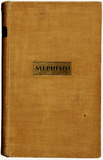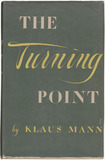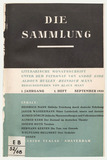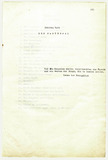Klaus Mann: Der Vulkan. Roman unter Emigranten, first edition (1939)
Klaus Mann: Der Vulkan. Roman unter Emigranten, first edition (1939)
Sie haben Dich ja lange nicht für voll genommen, ein Söhnchen in Dir gesehen und einen Windbeutel, ich konnt’ es nicht ändern. Aber es ist nun wohl nicht mehr zu bestreiten, daß Du mehr kannst als die meisten – [...] es ist doch ein Buch, dessen die deutsche Emigration sich auch unter dem Gesichtspunkt der Würde, der Kraft und des Kampfes nicht zu schämen hat, sondern zu dem sie sich, wenn sie nicht neidisch ist, froh und dankbar bekennen kann.
[For a long time they didn't take you seriously, they just saw a junior in you and a windbag, I couldn't change that. But now it can no longer be doubted that you're more talented than most – [...] it is a book for which the German émigrés have nothing to be ashamed with regard to their dignity, strength and valour but, on the contrary, if they are not envious, can be happy and grateful to call their own. (ed. trans.)]
Thomas Mann, letter to Klaus Mann, 22 July 1939
In his diary, Klaus Mann described his seventh novel, Der Vulkan, published by Querido Verlag Amsterdam in 1939, as his “most important” work. In it he presents a fictionalised examination of the life of emigrant groups in contemporary exile centres such as Paris, Zurich, Prague, Amsterdam and the US. Thomas Mann’s eldest son regarded the role of artists and intellectuals, whose ivory-tower musings, in his view, dissolved as ineffectually in exile as they had done in the face of National Socialism, with ever-increasing scepticism. Prototypical of this attitude is the sociologist David Deutsch, one of the main protagonists in Der Vulkan, who, bitterly disenchanted with theory, allows himself to be retrained as a craftsman in a Danish camp. He thus anticipates the disillusioned lethargy that Klaus Mann himself expresses in his last essay shortly before his suicide in 1949, Die Heimsuchung des europäischen Geistes [Europe’s Search for a New Credo]: “There is no hope. Whether we intellectuals are traitors or not, we would do well to recognise the complete hopelessness of our situation. Why should we fool ourselves? We're finished! We've been defeated!”
Der Vulkan, described by its creator as a “chronicle of the many missteps and transformations”, today is considered alongside Lion Feuchtwanger’s Exil (1940) and Anna Seghers’ Transit (1944) as one of the most important German exile novels. The book depicts defining experiences like the loss of language, loss of the homeland and anti-fascist resistance.





